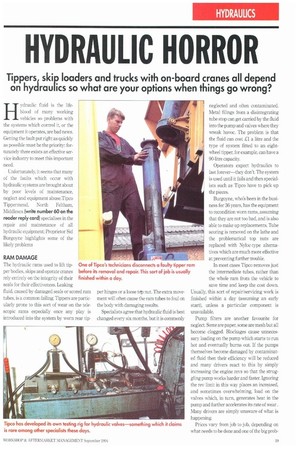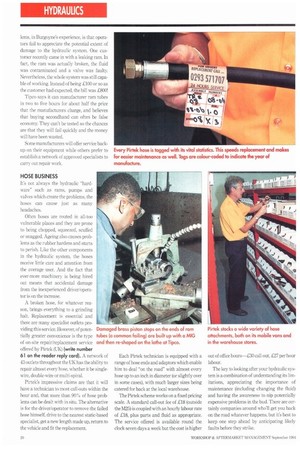HYDRAULIC HORROR
Page 103

Page 104

If you've noticed an error in this article please click here to report it so we can fix it.
Tippers, skip loaders and trucks with on-board cranes all depend on hydraulics so what are your options when things go wrong?
Hydraulic fluid is the lifeblood of many working vehicles so problems with the systems which control it, or the equipment it operates, are bad news. Getting the fault put right as quickly as possible must be the priority: fortunately there exists an effective service industry to meet this important need.
Unfortunately, it seems that many of the faults which occur with hydraulic systems are brought about by poor levels of maintenance, neglect and equipment abuse.Tipco Tippermend, North Feltham, Middlesex (write number 60 on the reader reply card) specialises in the repair and maintenance of all hydraulic equipment; Proprietor Sid Burgoyne highlights some of the likely problems
RAM DAMAGE
The hydraulic rams used to lift tipper bodies, skips and operate cranes rely entirely on the integrity of their seals for their effectiveness. Leaking fluid, caused by damaged seals or scored ram tubes, is a common failing. Tippers are particularly prone to this sort of wear on the telescopic rams especially once any play is introduced into the system by worn rear tip per hinges or a loose tap nut. The extra movement will often cause the ram tubes to foul on the body with damaging results.
Specialists agree that hydraulic fluid is best changed every six months, but it is commonly neglected and often contaminated. Metal filings from a disintegrating tube stop can get carried by the fluid into the pump and valves where they wreak havoc. The problem is that the fluid can cost £1 a litre and the type of system fitted to an eightwheel tipper, for example, can have a 90-litre capacity.
Operators expect hydraulics to last forever—they don't. The system is used until it fails and then specialists such as Tipco have to pick up the pieces.
Burgoyne, who's been in the business for 36 years, has the equipment to recondition worn rams, assuming that they are not too bad, and is also able to make up replacements. Tube scoring is removed on the lathe and the problematical top nuts are replaced with Nyloc-type alternatives which are much more effective at preventing further trouble.
In most cases Tipco removes just the intermediate tubes, rather than the whole ram from the vehicle to save time and keep the cost down. Usually, this sort of repair/servicing work is finished within a day (assuming an early start), unless a particular component is unavailable.
Pump filters are another favourite for neglect, Some are paper, some are mesh but all become clogged. Blockages cause unnecessary loading on the pump which starts to run hot and eventually burns out. If the pumps themselves become damaged by contaminated fluid then their efficiency will be reduced and many drivers react to this by simply increasing the engine revs so that the struggling pump works harder and faster, Ignoring the rev limit in this way places an increased, and sometimes overwhelming, load on the valves which, in turn, generates heat in the pump and further accelerates its rate of wear. Many drivers are simply unaware of what is happening.
Prices vary from job to job, depending on what needs to be done and one of the big pnob lems, in Burgoyne's experience, is that operators fail to appreciate the potential extent of damage to the hydraulic system. One customer recently came in with a leaking ram. In fact, the ram was actually broken, the fluid was contaminated and a valve was faulty. Nevertheless, the whole system was still capable of working. Instead of being £100 or so as the customer had expected, the hill was £800!
Tipco says it can manufacturer ram tubes in two to five hours for about half the price that the manufacturers charge, and believes that buying secondhand can often be false economy. They can't be tested so the chances are that they will fail quickly and the money will have been wasted.
Some manufacturers will offer service backup on their equipment while others prefer to establish a network of approved specialists to carry out repair work.
HOSE BUSINESS It's not always the hydraulic "hardware" such as rams, pumps and valves which create the problems, the hoses can cause just as many headaches.
Often hoses are routed in all-too vulnerable places and they are prone to being chopped, squeezed, scuffed or snagged. Ageing also causes problems as the rubber hardens and starts to perish, Like the other components in the hydraulic system, the hoses receive little care and attention from the average user. And the fact that ever-more machinery is being hired out means that accidental damage from the inexperienced driver/operator is on the increase.
A broken hose, for whatever reason, brings everything to a grinding halt. Replacement is essential and there are many specialist outlets providing this service. However, of potentially greater convenience is the type of on-site repair/replacement service offered by Pirtek (UK) (write number 61 on the reader reply card). A network of 43 outlets throughout the UK has the ability to repair almost every hose, whether it be singlewire, double-wire or multi-spiral.
Pirtek's impressive claims are that it will have a technician to most call-outs within the hour and, that more than 90% of hose problems can be dealt with in situ, The alternative is for the driver/operator to remove the failed hose himself, drive to the nearest static-based specialist, get a new 'length made up, return to the vehicle and fit the replacement. Each Pirtek technician is equipped with a range of hose ends and adaptors which enable him to deal "on the road" with almost every hose up to an inch in diameter (or slightly over in some cases), with much larger sizes being catered for back at the local warehouse.
The Pirtek scheme works on a fixed pricing scale. A standard call-out fee of £18 (outside the M25) is coupled with an hourly labour rate of £18, plus parts and fluid as appropriate. The service offered is available round the clock seven days a week but the cost is higher out of office hours—L30 call-out. £27 per hour labour.
The key to looking after your hydraulic system is a combination of understanding its limitations, appreciating the importance of maintenance (including changing the fluid) and having the awareness to nip potentially expensive problems in the bud. There are certainly companies around who'll get you back on the road whatever happens, but it's best to keep one step ahead by anticipating likely faults before they strike.
























































































































